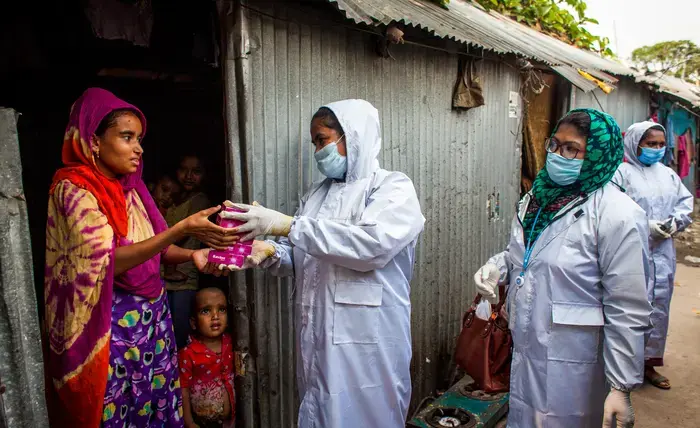Watch the recording
Background
While the spread of COVID-19 was delayed for some of the most fragile and conflict-affected areas, by mid-March the fragile countries that are most connected with the world’s economy were affected, followed by the rest. Today, practically every corner of the world has been affected by the pandemic.
Countries facing conflict or fragility are particularly exposed to the array of COVID-19 risks as health factors collide with existing preconditions - political, economic and societal. Furthermore, exposure to infectious diseases has been shown to increase the risk of armed conflict and COVID-19 specifically may also generate new as well as exacerbate existing conflicts. This presents a multi-dimensional threat, where failure to address conflict and fragility as part of pandemic response is detrimental to the efforts to minimize transmissions.
Yet the outbreak of the new coronavirus could also trigger a positive turning point. The private sector is seizing the opportunity to work alongside governments, UN entities, civil society and other actors even in the most challenging environments. Businesses are procuring personal protective equipment, raising awareness of mitigation measures, providing food and non-food items, supporting small businesses in their value chains, and engaging in policy dialogues. As businesses continue to support efforts to tackle COVID-19, it is important to ensure that their interventions do not adversely affect the conflict dynamics or other structural challenges in the countries where they operate. Going further, the private sector can even become a catalyst for peace - strengthening social cohesion, battling misinformation, fostering trust, supporting the most vulnerable and more.
Objective and format
Organized as a 30-minute facilitated, yet interactive dialogue, the discussion explored the confluence of crises – when the COVID-19 pandemic coincides with vulnerability or conflict. Recognizing the positive role private sector entities can play in addressing crises from disease outbreaks to instability, this webinar provided an opportunity for the speakers and participants to reflect on actions and ideas that leverage business action and public-private partnerships. Representing different sectors, the speakers particularly focused on:
- Raising awareness of the challenges that COVID-19 poses to fragile situations and conflict-affected areas, including how conflict and fragility impact pandemic mitigation measures;
- Discussing private sector (network) contributions to peace and stability – before, during and after COVID-19;
- Proposing practical solutions and highlighting existing examples of how businesses are working alongside governments, the UN, civil society organizations and other stakeholders in fragile situations and conflict-affected areas.
Speakers (in alphabetical order by last name)
Christina Bache is a Visiting Fellow at the London School of Economics and Political Science, IDEAS, and Chair of the United Nations Principles for Responsible Management Education, Working Group on Business for Peace. She is also Co-Chair of the International Crisis Group's Ambassador Council and an adjunct faculty member at Vesalius College.
Moderator: Michelle Breslauer has broad experience leading partnerships, public affairs and strategic development for a range of organizations. She currently manages the governance and peace portfolio at the United Nations Global Compact, the world’s largest corporate sustainability initiative that brings together 12,000 companies in 163 countries and 70 local networks around the world.
Rein Paulsen manages the Coordination Division, including the Inter-Agencies Services Branch, the Assessment, Planning and Monitoring Branch and the Emergency Response Support Branch. The Division is responsible for assessing situations and needs; supporting the leadership of Humanitarian Coordinators; managing a range of rapid response tools; developing common strategies to address issues such as negotiating access, mobilizing funding and other resources; and monitoring progress.
Additional readings
-
Engaging companies in manmade disasters - a guidance toolkit for private sector networks
-
Peace and stability during the COVID-19 pandemic: Private sector contributions (blog)
-
COVID-19 in conflict affected areas – What the Private Sector Can Do (blog)
-
The ABC for helping companies address manmade disasters (blog)
About the organizers
Connecting Business initiative
The Connecting Business initiative (CBi) transforms how the private sector engages before, during and after crises. The initiative is jointly managed by UNDP and OCHA, and supported by partners including the UN Global Compact. It increases the resilience of companies and people, while integrating private sector networks into disaster management mechanisms. In 2019, CBi Member Networks and their partners responded to 31 crises including earthquakes, cyclones, political unrest and health epidemics. In 2020, all the networks have been working to address COVID-19, but many have also faced natural hazards to which their contributions have been invaluable. CBi Networks play critical roles by participating in search and rescue operations, collecting and distributing relief aid, restoring critical infrastructure, sharing information, making financial contributions and working alongside governments and aid organizations. More information at: www.connectingbusiness.org
United Nations Global Compact
The United Nations Global Compact is the world’s largest corporate sustainability initiative. Launched in 2000 as a special initiative of the UN Secretary-General, the mission of the UN Global Compact is to mobilize a global movement of sustainable companies and stakeholders to create the world we want. Businesses that join the initiative commit at the CEO level to align their corporate strategies and operations with Ten Principles on human rights, labour, environment and anti-corruption and take actions to support the Sustainable Development Goals (SDGs). Through providing authoritative guidance, training, tools and support, and connecting stakeholders across the globe, the UN Global Compact enables businesses of all sizes and from all sectors to achieve their sustainability objectives. More information at: www.unglobalcompact.org
For more information, please click the icon below to download the concept note.

